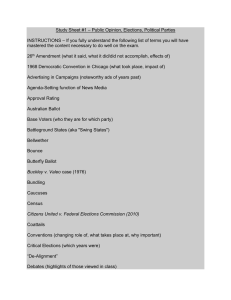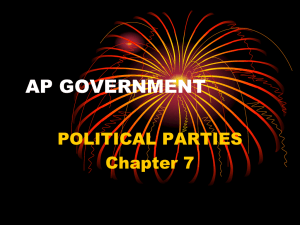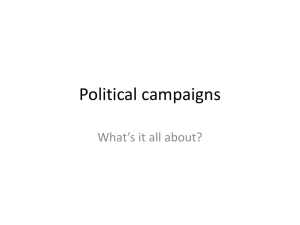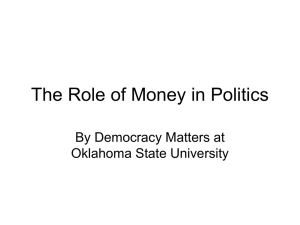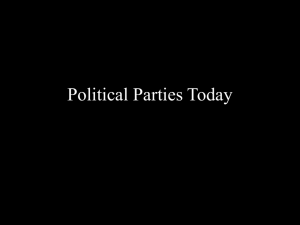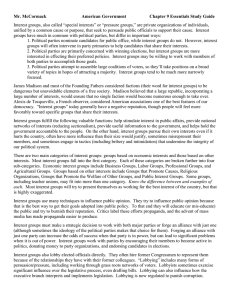Elections and Campaigns
advertisement
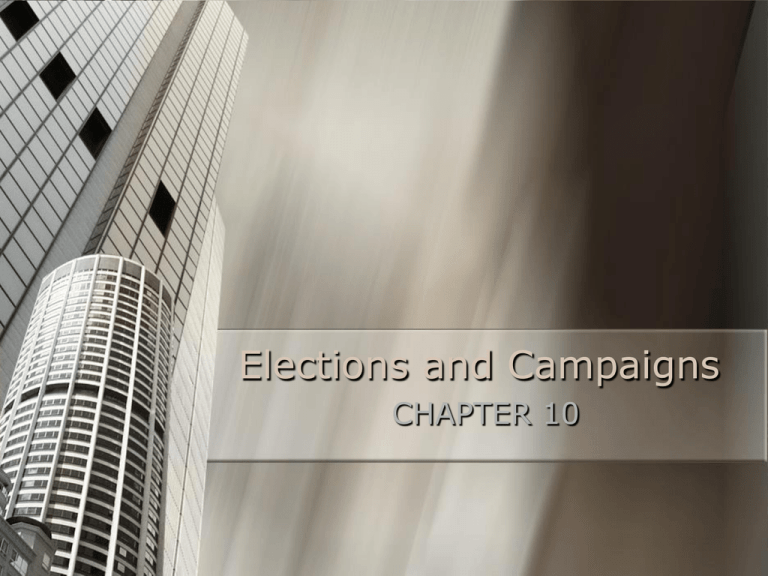
Elections and Campaigns CHAPTER 10 Presidential Versus Congressional Campaigns Presidential and congressional races differ in four important ways. The First, Presidential races are more competitive than those for the house of representatives. In the thirty five elections form 1932 to 2000 the republicans won control of the house only six times. In the eighteen presidential elections during the same period the republicans won the white house on eight occasions Second, a much smaller proportion of people vote in congressional races during off years ( that is , when there is no presidential contest) than vote for president. Cont… Third, members of congress can do things for their constituents that a president cannot. They take credit-sometimes deserved. Sometimes not-for every grant, contract, bridge, canal, and highway. The federal government provides the district or the state. Fourth, a candidates for congress can deny that he or she is responsible for “the mess in Washington” even when the candidate is an incumbent. Incumbents tend to run as individual, even to the point of denouncing the very congress of witch they are a part. Cont… Fourth, a candidates for congress can deny that he or she is responsible for “the mess in Washington” even when the candidate is an incumbent. Incumbents tend to run as individual, even to the point of denouncing the very congress of witch they are a part. Running for president The task facing anyone who wishes to be president is to get mentioned as some one who is of presidential caliber no one is quite sure why some people are mentioned and others are not. Money: one reason why running takes so much time is that it takes so long to rise the necessary money and build up an organization of personal followers. Organization: raising and accounting for this money requires a staff of fund-raisers, lawyers, and accountants. Strategy and themes: every candidates picks a strategy for the campaign. In choosing one, much depends on whether you are the incumbents Getting Elected to Congress A president cannot serve more than two terms so at least once every eight years you have a chance of running against a no incumbent members of co0ngress can serve for an unlimited number of terms and so chances are you will run against an incumbent. Winning the primary: however the district lines are drawn, getting elected to congress first requires getting one’s name on the ballot. Staying in office: have 2 ways first, produce legislator who are closely tied to local concerns. Second, ensures that party leaders will have influence over them Television, Debates, and Direct Mail • • • • • • Main way of campaigning is broadcasting -Spots -Visuals Television effect on voting very small to non Exiting -Voters have other resources Visual v. spots -Spots are more affective -Spots have more information leave on impression on viewers -Visual are harder to make effective Televised campaign debates -No data on how they may affect an election -Can give rise to unknown candidates Interest -Lists -Target certain groups of people -Less chance of offending some one Running a campaigns has become has separated from governing Money Money is the mother’s milk of politics” Candidates with most money don’t always win House & senate spend over half a billion dollars in 2002 on adds The Sources of Campaign Money Presidential candidate -Private donors -Federal government Congressional candidates get their money from private sources -gov’t also gives parties up to 74.4 million dollars -most money comes from small donations Campaign Finance Rules Individuals can’t contribute more than $1,000 Political Action Committee (PAC) at least 50 members, no more than $5,000 to least 5 candidates Independent expenditures: spending by an organization (PAC, Union, etc.) that is done to help a party or candidate but is done independently of them Soft money: funds obtained by parties that are spent on party activities, such as get out and vote drives, but not for a specific candidate. Finding A Winning Coalition There are to ways to find out the nature of party’s voting coalition #1 to ask what % of groups in the population support the Democratic party or Republican candidate for president - This answers how loyal the groups (unions, farmers, etc) are #2 to ask what proportion of a the party’s total vote came form each group (African Americans, Asians, Hispanics, etc) -this informs us how important each group is to a candidate or party Cont… Democratic–Africans are the most loyal voters except in -1952 2/3 voted Democratically -1964 4/5 voted Democratically Hispanic turn out low, most not citizens so political power is not equivalent to their #’s Republicans often describe as a party of business & professional people, loyally is strong except in 1964 to support Lyndon Johnson Farmers are sensitive to farm prices thus quick to change parties Every year a winning coalition must be made to win votes The Effects of Elections on Poling The election of 1964 democrats such a large majority in congress & presidency brought forth new policies -Medicare& Medicaid -Federal aid to education & local enforcement -Two dozen environmental & consumer protection laws -Voting Rights Act of 1965 -revision of immigration laws -A new cabinet-level Dept of Housing & Urban Development A Second Campaign Finance Law The campaign finance reforms of 1970 made it harder for new candidates to raise money ( especially for those who are not wealthy Eg.- -individual contributions = $250 or less -Interest groups and corporations = $5,000 or less -Self contributions = unlimited A congressional movement to reform the 1970's created the Biparistian finance reform act of 2002. This act: -banned sort money ( from corporations and unions) -the amount of individual contributions was raised from $1,000 to$2,000 -imposed sharp restrictions on “independent expenditures” by corporations, labor unions, etc.. New sources of money Programs such as Media Fund and American Voters are generated by those who can no longer contribute with “soft money” and still want to support a candidate Eg.- a wealthy man donated $23 million to an organization who wanted to defeat George Bush Money and Winning In presidential campaigns, money does not matter as much because candidates receive the same amount of money from the federal government 3 significant aspects that affect presidential candidates on the election outcomes -Political affiliation, 80% of presidential votes go to candidates from eighter of the 2 main parties (Democrats or Republicans) -the state of the economy In good economic times party holding the White House does well, and in bad, it it does badly -the character of the candidate Does the candidate think as the voters think about social issues ( abortion, gun control, etc.?) What decides the election Voters tend to vote their party identification , even if they don’t know the candidates position on a certain issue. Primary Versus General Campaigns Primary elections- designed to choose each party’s nominee. General elections- picks the winner who would hold office. Some states like Iowa hold caucuses instead of primary elections. What may help you win a primary election or a caucus can be different from what will help you win a general election. Democrats who participate in the Iowa caucus tend to be more liberal than Democrats generally. Two Kinds of Campaign Issues Position issues- an issue about which the public is divided and rival candidates or political parties adopt different policy positions. Valence issue- an issue about which the public is united and rival candidates or political parties adopt similar positions in hopes that each will be thought to best represent those widely shared beliefs. Issues, Especially the Economy Even though voters may not know a lot about the issues, it doesn’t necessarily mean that issues play no role in elections or that voter’s respond irrationally to them. Voters are more informed about issues that really matter to them, issues like whether unemployment is up or down, prices at the supermarket are stable or rising, or crime is a problem in their neighborhoods. In contrary to issues such as monetary policy, business regulation, and the trade deficit. On certain issues like abortion, school prayer, and race relations they are likely to have some strong principles that they want to see politicians obey. Politics can function without well informed citizens Two ways in which issues can affect elections Two ways in which issues can affect elections Prospective voting - voting for a candidate because you favor his or her ideas for handling issues. It requires a lot of information about issues and candidates. They are a minority of all voters. Retrospective voting – Voting for a candidate because you like his or her past actions in office. Does not require you to have a lot of information, the only thing that should be clear is whether things have, in your view, gotten better or worse. Elections are decided by retrospective voters. An example of retrospective voting was in the elections of 1980 in which voters decided to vote against jimmy carter because in their view things had gotten worse under his command. People then decided to vote for the other candidate the alternative candidate, Ronald Reagan. In simple terms people weren’t necessarily voting for Reagan they were just NOT voting for Carter…does that make sense The Campaign Campaigns can make a difference in 3 ways They reawaken the partisan loyalties of voters. Campaigns give voters a chance to watch how the candidates handle pressure, and they give candidates a chance to apply that pressure. Campaigns allow voters an opportunity to judge the character and core values of the candidates. Once the campaign has begun both candidates immediately start searching each others personal history, records and statements in order to portray the worst possible image in newspaper or TV ads. Many voters don’t like these negative ads but they work by stimulating voter turnout. Voters receive guidance as to how a candidate will behave once elected by listening to the themes and tone of his statements in contrast to the details of what he actually says. Today activists and single-issue groups influence the selection of candidates, sometimes out of a belief that it is better to loose with the right candidate than to win with the wrong one.
